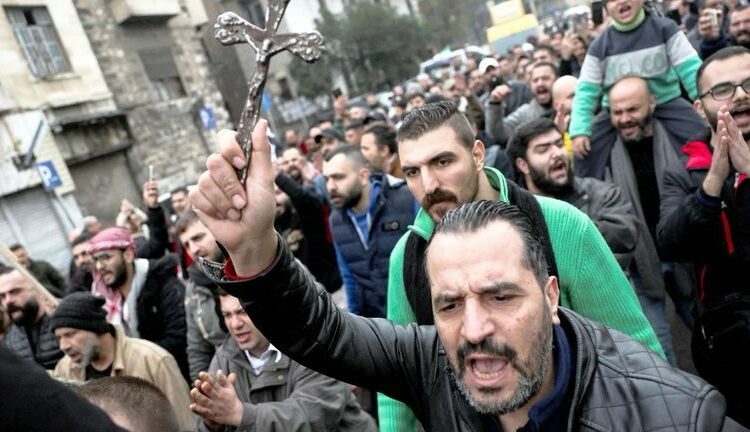Protests have erupted across Syria after masked gunmen set fire to a Christmas tree in Suqaylabiyah, a Christian-majority town near Hama.
The incident sparked outrage among religious minorities and raised questions about the security of Christians under the new Islamist leadership.
A video shared on social media showed two masked men burning the tree in the town’s main square on the eve of Christmas celebrations.
The arson attack, which was widely condemned, prompted thousands of demonstrators to take to the streets, demanding protection for religious minorities.
Hayat Tahrir al-Sham (HTS), the Islamist faction that recently took power after toppling President Bashar al-Assad, said the men responsible for the attack were foreign fighters. The group announced that the suspects had been detained.
In a bid to reassure the Christian community, a religious leader from HTS addressed the crowds in Suqaylabiyah, promising that the tree would be repaired by morning. In a symbolic gesture of solidarity, the leader held up a cross, a rare move for Islamist conservatives.
The attack ignited nationwide protests. In Damascus, demonstrators in the Kassa neighbourhood called for the expulsion of foreign fighters. “Syria is free, non-Syrians should leave,” they chanted, reflecting growing discontent with foreign influence in the country.
In Bab Touma, another predominantly Christian neighbourhood in Damascus, protesters carried crosses and Syrian flags, chanting, “We will sacrifice our souls for our cross.” A demonstrator named Georges told AFP, “If we’re not allowed to live our Christian faith in our country, as we used to, then we don’t belong here anymore.”
Syria’s diverse population includes Kurds, Armenians, Assyrians, Christians, Druze, Alawite Shia, and Arab Sunnis, the latter being the majority of the Muslim population. Protecting the rights of these minorities has become a critical challenge for HTS, which is transitioning from its jihadist roots to governing a fractured nation.
HTS, once known for its hardline stance and links to al-Qaeda, attempted to adopt a more inclusive approach in recent years. As the group’s fighters marched into Damascus earlier this month, its leaders promised to build “a Syria for all Syrians” and protect the rights and freedoms of minorities.
Despite these assurances, HTS remained designated as a terrorist organisation by the United Nations, the United States, the European Union, and the United Kingdom.
However, recent developments suggested a potential diplomatic shift. The US recently scrapped a $10 million bounty on HTS leader Ahmed al-Sharaa after meetings between senior diplomats and HTS representatives.
The United States, which continued its military presence in Syria, carried out an airstrike in Deir Ezzor on Friday, killing two Islamic State (IS) fighters.
The burning of the Christmas tree underscored the challenges facing HTS as it sought to govern Syria. The presence of foreign fighters, Islamic extremists, and remnants of Assad regime loyalists threatened to destabilise the fragile nation and undermine efforts to protect minorities.
As Syria adjusts to its new leadership, the ability of HTS to maintain security, foster unity, and uphold its promises of inclusivity will determine the country’s future. For now, the Christmas tree in Suqaylabiyah stands as a symbol of the tensions and hopes of a divided nation.
Leadership













